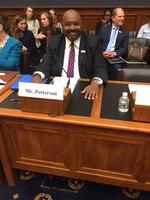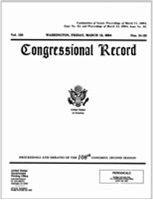CLPHA supports the nation’s largest and most innovative housing authorities by advocating for the resources and policies they need to solve local housing challenges and create communities of opportunity. We frequently champion our members' issues, needs, and successes on the Hill, at HUD, and in the media. In these arenas CLPHA also advocates for legislation and policies that help our members, and the public and affordable housing industry as a whole, strengthen neighborhoods and improve lives.
Click below for links to congressional testimonies, statements for the record, action alerts, comments to HUD and other federal agencies, and the latest information about CLPHA's multi-pronged housing advocacy.
- « first
- ‹ previous
- 1
- 2
- 3
- 4
This week, CLPHA and our counsel Reno & Cavanaugh submitted comments to HUD regarding the agency's interim final rule “Restoring Affirmatively Furthering Fair Housing Definitions and Certifications." Our comments applaud HUD's renewed commitment to fair housing embodied in the Interim Final Rule and to repeal the previous administration’s attempt to eliminate the duty to affirmatively further fair housing. We also provide additional comments in anticipation of HUD’s forthcoming final AFFH rulemaking.
|
(Washington, D.C.) June 17, 2021 – The nation's leading advocacy organizations representing public housing authorities have come together to support universal housing vouchers. The Council of Large Public Housing Authorities, the Moving to Work Collaborative, the National Association of Housing and Redevelopment Officials, and the Public Housing Authorities Directors Association have released the joint letter below:
"Safe, secure, and stable housing is as essential to America’s social safety net as are Social Security, Medicaid and Medicare. Housing stability is central to improving life outcomes and economic mobility for low-income Americans. However, only one in five low-income households that are eligible to receive housing assistance can be served by existing programs due to limited funding. The pandemic has reinforced that rental assistance, such as the Housing Choice Voucher (HCV) program, is critical to ensuring housing stability and managing sudden losses in income. Just as Social Security, Medicare and Medicaid are structured to be available to all who are eligible, rental assistance must be too. Expansion of the voucher program offers a proven and effective approach to scale universal housing assistance to address housing instability and prevent homelessness in America.
Housing Choice Vouchers are a proven source of permanent housing stability. They are highly effective at providing long-term financial stability to formerly homeless populations and others experiencing housing instability. A recent HUD study found that offering families a permanent housing voucher resulted in greater housing and family stability compared to short-term interventions. Furthermore, a recent study from Columbia University found that expanding housing vouchers to all eligible households could help reduce poverty by 9.3 million people as well as reduce racial disparities in poverty. Vouchers are also frequently paired with supportive services to offer comprehensive assistance to individuals with complex mental and physical health conditions. Public housing authorities are uniquely positioned to aid low-income families in their challenges to regain employment and support children’s virtual learning because of their partnerships with nonprofit and government service providers that focus on education, health, and employment. Harvard’s Joint Center for Housing Studies recently reported on the critical role that service coordinators in publicly funded housing have played in providing food and supplies, assisting with technology, and combatting resident anxiety and loneliness. Housing Choice Vouchers are a proven and effective rental assistance delivery system to scale universal housing assistance because they can be quickly distributed through the existing network of 2,200 state and local housing agencies that administer vouchers in urban, suburban, and rural areas. Housing authorities are trusted experts and partners in their local rental markets, have been administering the voucher program for nearly 50 years and are accountable to local and federal oversight and operate with significant public input. With the proper funding, housing authorities have the capacity for a rapid expansion. Housing vouchers power local communities. Landlords, many of whom operate as a small business, understand that the voucher program is a guaranteed, reliable income source and provides the benefit of long-term stability. PHAs have been using the additional funding and regulatory relief provided by the Coronavirus Aid, Relief, and Economic Security (CARES) Act to expedite administrative processes most often cited by landlords as reasons for preferring unassisted tenants. With this funding, PHAs have also been able to offer incentives and support to increase landlord participation in the HCV program. We must strive to be a nation that believes that all people deserve the security that comes from having a home. Housing Choice Vouchers are the path to achieving this vision." |
|
||||||
|
|||||||
|
|
||
|
About the Council of Large Public Housing Authorities
About CLPHA’s Housing Is Initiative |
||
|
(202) 550-1381
For Immediate Release
May 11, 2021 |
|
|
(Washington, D.C.) May 11, 2021 – CLPHA Executive Director Sunia Zaterman released the following statement supporting the New York City Housing Authority’s call to double the public housing infrastructure investment proposed in the American Jobs Plan to $80 billion:
“The Council of Large Public Housing Authorities urges the Senate Majority Leader to stand firm on his call to double the public housing infrastructure investment in the American Jobs Plan to $80 billion in his meeting today with President Biden, Speaker Pelosi and GOP leadership.
“The New York City Housing Authority deserves its fair share of Senator Schumer’s request since it serves nearly double the amount of residents than any other housing authority, and its housing portfolio is among the oldest in the nation. Decades of chronic disinvestment has driven its unmet capital repairs alone to $40 billion. The $80 billion request enjoys critical support from Congresswoman Nydia Valezquez (D-NY) and the NYC-area Congressional delegation. This investment would also be a significant step to addressing racial inequity, a key priority of the Biden administration.
“As the American Jobs Plan moves through the legislative process, political leaders must guarantee that housing will remain in the infrastructure bill and that the commitment to recapitalize public housing infrastructure be doubled to $80 billion so that the needs of NYCHA and public housing portfolios across the nation are adequately met.”
|
|
|
|
|
||
|
|
||
|
About the Council of Large Public Housing Authorities
About CLPHA’s Housing Is Initiative |
|
|







